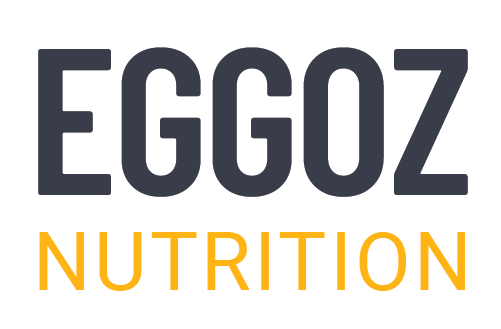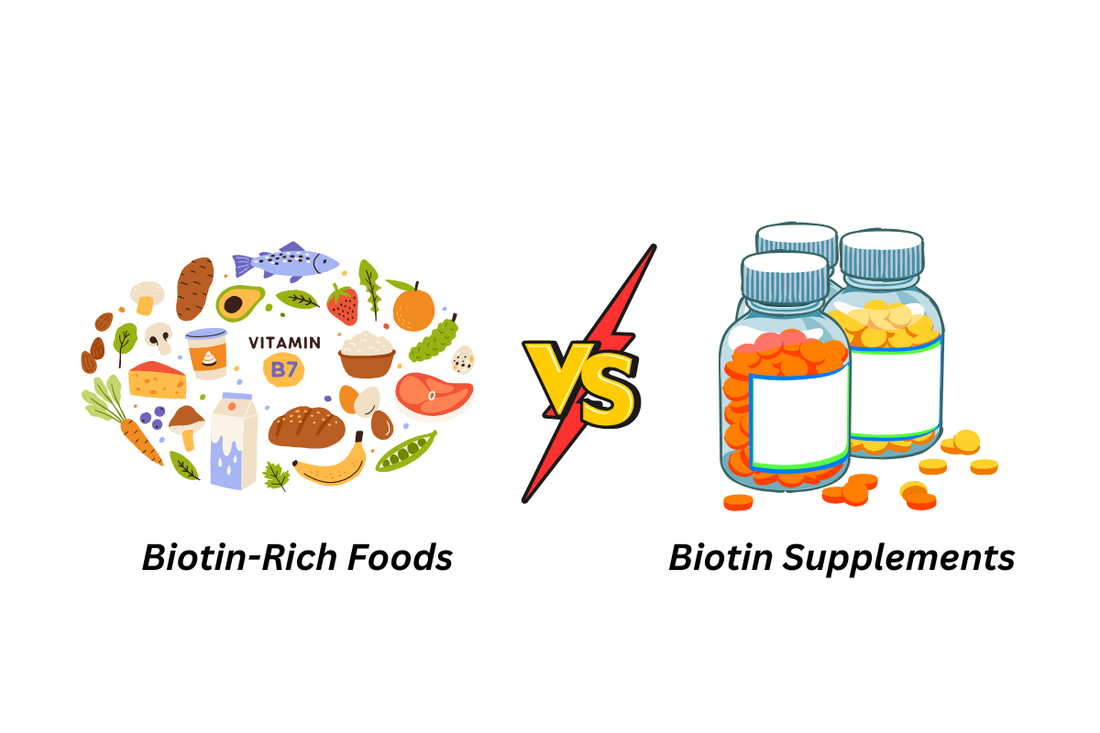Biotin is a popular nutrient gaining significant attention worldwide. Also known as Vitamin B7 or Vitamin H, biotin plays a vital role in maintaining healthy hair, skin, and nails, while also supporting energy metabolism and nervous system function. But with so many biotin-rich foods readily available—such as eggs, almonds, and spinach—do we really need supplements?
In this blog, we’ll explore the importance of biotin for our bodies, the symptoms of low biotin, and the key differences between foods containing biotin and supplements.
Biotin's Health Benefits
The body needs biotin, a vitamin B7 dietary, for many processes. Metabolism uses it as a coenzyme to break down macronutrients. Energy from food feeds biological functions and cell growth, ensuring tissues obtain the nutrients they need to function properly.
Besides metabolism, biotin in foods helps maintain healthy hair, skin, and nails. Keratin formation is essential for strong hair and nails, and this nutrient helps. Getting enough biotin for hair may assist with hair loss and brittle nails. Vitamin H aids neurotransmitter action in the nervous system, making it essential for mental health and cognition. Biotin is vital for foetal development during pregnancy, reducing birth abnormalities.
Low-Biotin Symptoms:
Although rare, biotin deficiency can cause health problems. Five signs of low biotin:
- Hair Loss and Thinning: Hair thinning and loss are the most obvious symptoms of biotin deficiency.
- Cracked Nails: The vitamin biotin is necessary for nail strength, thus a lack of it can weaken and break nails.
- Dry Skin, Rashes: Biotin-rich meals are important for skin health since low biotin levels cause red, scaly rashes around the eyes, nose, and mouth.
- Long-term fatigue: Low biotin levels might cause fatigue due to energy metabolism.
- Changes in mood and cognition: Biotin deficiency can induce mood changes, sadness, and cognitive impairment.
Which is better: biotin food or supplements?
Understanding biotin differences between foods and supplements can help choose the optimal source. Five key differences:
1. Bioavailability, absorption: Food biotin is more bioavailable than supplement biotin. Many biotin vitamin foods contain other nutrients that help absorb and boost its efficiency. Though biotin pills are concentrated, they may lack complimentary elements present in whole foods. Biotin-rich foods may be better for natural absorption.
2. Control Dose: Natural biotin levels are balanced and safe, thus overdose is unlikely. Although safe, supplements can deliver exceptionally high levels of biotin, which may interfere with lab testing and cause modest adverse effects in some people. For those who value natural biotin, balanced dietary levels usually solve these problems.
3. Nutrition: Unlike supplements, vitamin biotin meals contain other vitamins, minerals, and fibre for greater health advantages. In addition to biotin, nuts and eggs include protein, healthy fats, and other B vitamins that support general health, making them ideal for holistic nutrition.
4. Accessibility, affordability: Many people find biotin-rich meals like eggs, almonds, and leafy greens affordable and easy. For those without access to biotin-rich foods or with dietary limitations, biotin supplements may be more cost-effective. However, biotin in foods frequently offers superior nutritional value.
5. Personal Needs and Health: Supplements may help persons with health conditions that hinder nutritional absorption. For those who need extra biotin or have trouble digesting, supplements may work better. For most persons without these disorders, biotin meals are sufficient. Food-based biotin is preferable due to its synergistic nutrients. Biotin supplements may help those with higher needs or absorption issues. A doctor can advise on biotin supplements or meals for certain health conditions.
5 Biotin- Rich Foods:
By eating a variety of biotin vitamin foods, you can meet your daily biotin needs and get other nutrients. These five biotin-rich foods are easy to integrate into your diet:
1. Eggs: The yolks of eggs are a major biotin source. Cooked eggs include 10 mg of biotin, making them a good hair and nail health food. Beyond biotin, eggs provide protein, vitamin D, and good fats for overall health.
2. Almonds: Biotin, vitamin E, fibre, and good fats are found in almonds. A quarter-cup of almonds contains 1.5 microgrammes of biotin. These nuts can be eaten alone or in other cuisines.
3. Spinach: Spinach is high in biotin, iron, vitamins A and C, and folate. Biotin is 0.5 microgrammes per half-cup of cooked spinach. This low-calorie, nutrient-dense diet supports hair, skin, and nail health.
4. Salmon: This fatty fish contains biotin and heart-healthy omega-3 fatty acids. Salmon contains 5 microgrammes of biotin per 3-ounce serving. High in protein, vitamin D, and selenium, it complements a balanced diet.
5. Sweet Potatoes: Sweet potatoes contain biotin and beta-carotene, which boosts skin and immunological function. One-half cup of cooked sweet potatoes contains 2.4 microgrammes of biotin. They are adaptable and easy to cook.
Conclusion:
The body needs biotin for energy metabolism, hair, skin, and nail health. Natural and balanced biotin foods match daily needs, but biotin supplements offer convenience and a concentrated amount that may assist specific needs. Adding Eggoz eggs to your diet can help support your body’s biotin needs naturally, giving you a tasty and nutrient-dense way to maintain your health. Biotin in foods is a more comprehensive way to meet nutritional needs, however, supplements can help those with higher biotin needs or specific health conditions.


